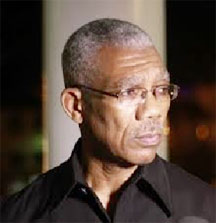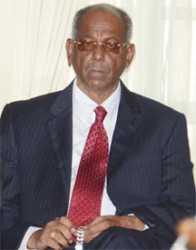Former PPP/C executive Ralph Ramkarran has rapped PNCR Leader David Granger for his citing of the late Executive President Forbes Burnham as an advocate of national unity.
Ramkarran in a column in yesterday’s Sunday Stabroek excoriated Burnham’s appeals for national unity as insincere and said it was the late Executive President Dr Cheddi Jagan and the PPP that had made significant plays for national unity.
Granger’s citing of Burnham’s remarks was contained in a statement issued

last week to mark the 56th anniversary of the PNC.
In a column entitled, `The PNC, APNU and national unity’, Ramkarran took Granger to task.
He cited several of Burnham’s quotes in the 1970s uttered by Granger in the press release including “We have avoided the adoption of superficial solutions which do not involve the masses of our people and which do not resolve the deep-seated prejudices which impede national unity” and “Some of our friends as well as enemies speak and shout about the need for national unity. The need for national unity is axiomatic and cannot be questioned. Where the differences of opinion arise, they do so in respect of the means of achieving unity on a class basis.”
Ramkarran argued that Burnham was speaking with tongue in cheek.
“The basis of his political strength was Western economic aid and support by way of silence about rigged elections and subversion of democracy. In exchange for that support he was required to keep the PPP out of power and in the political wilderness. His political survival depended on maintaining disunity. His talk about unity therefore was subtly constructed to preclude political engagement. He scuttled the talks which were initiated as a result of the PPP’s ‘Critical Support’ in 1975. He ridiculed the proposals for a ‘National Patriotic Front’ made in 1977, even though the PPP conceded in them that the PNC would hold the executive presidency”, the former two-term Speaker of the National Assembly contended.
Ramkarran said it was the position of Dr Jagan, and supported then and now by almost all of the country that only political unity would eventually generate sufficient ethnic cohesion which would then lead to real economic transformation. He said that a political solution could not and was never intended to be achieved by Burnham or by the Burnham way.
“Ethnic cleavages are a fact of our existence. Their political expression in organizational exclusivity is likely to remain for some time to come. It is the organizations that must first engage, then seek to mobilize their supporters, around an agreed way forward.

It is therefore very disappointing to note that Mr Granger’s tone reflects similar sentiments as Burnham’s. No one is asking Brigadier Granger to change his views about his revered leader. But the words of all past leaders, including Cheddi Jagan, have to be assessed within the context of their times and challenges”, Ramkarran, who quit the PPP after nearly 50 years, argued.
Ramkarran, whose father Boysie was also a longstanding senior PPP leader, noted that in 1984-85 the political situation in Guyana underwent vast change.
He said that against the backdrop of repeated calls by the PPP for a political solution, the devastation of the economy, demands by the International Monetary Fund which Burnham found unacceptable and a pronounced leftward shift by Burnham, talks with the PPP were initiated by the PNC to seek a political solution. “While there was still a great deal of distrust due to continuing political suppression, the PPP was of the view that the conditions in 1984 offered some possibility that success could be achieved”, Ramkarran said.
He pointed out that Burnham died suddenly in 1985 and the late President Desmond Hoyte assumed the presidency and immediately broke off the talks. He said with the Cold War still on the political formula remained the same – keep the PPP out of power if you want Western help.
Ramkaran said that by the mid-1990s, with the PNC out of office, a movement developed in the PNC by young, forward looking, leaders for shared governance. Ramkarran said that they were officially given the latitude to publicly express their views which was unprecedented in the country’s political culture. He said that Hoyte eventually came around to supporting the idea around 2001.
“Despite the horrific suppression and violations of human rights by the PNC even after 1985, the two signal departures from their (disingenuousness) about unity were the 1984 talks and the 2001 adoption of the policy of shared governance, akin to the PPP’s and Cheddi Jagan’s ‘winner does not take all.’ In fact the phrase ‘shared governance’ was first used by Cheddi Jagan”, Ramkarran declared.
He added “That is why Brigadier Granger’s statement is a disappointment. Read carefully, it reflects the same sentiments that Burnham had insincerely expressed in the 1970s. While Brigadier Granger is not Burnham, his statement does not take into account the positive developments within the PNC in the 1984 and 2001 periods. By choosing to promote Burnham’s words on unity in the years when he rejected unity, having initially broken it in 1955, he lost the opportunity to emphasize or expand on the more positive developments of 1984 and 2001.”
Ramkarran said that such an approach could have helped to create the conditions for A Partnership for National Unity (APNU), which Granger also leads, to boldly promote the only strategy that can liberate the country from the gridlock that now exists – a political solution.
In his statement, Granger, also Opposition Leader, had said that while some circumstances had changed over the last 56 years, the need for national unity still persisted. He noted that it was against this background that the PNCR had taken the opportunity to join APNU which seeks to adopt the best “means of achieving” national unity by combining its efforts with others.
According to Granger, the party’s efforts to eradicate discrimination and to erect infrastructure on which a unified nation can be built are among its most historical achievements. “The PNCR recognises the historical damage that racial hatred and political prejudice have wrought. The PNCR respects the rights of every ethnic, religious and social group,” he said.
Granger said that on the occasion of the milestone anniversary, the party was renewing its commitment to continue to work to overcome the remaining obstacles to national unity. He added that the party, especially through APNU, remains willing to work with any agency, organisation, party or individual to foster unity in Guyana.





